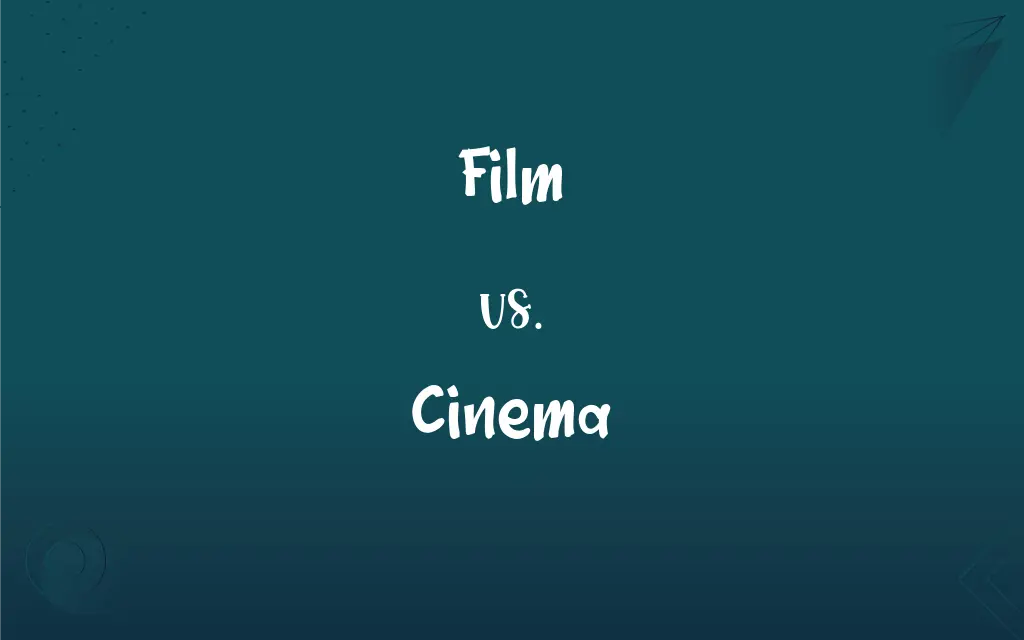Film vs. Cinema: What's the Difference?
Edited by Aimie Carlson || By Janet White || Published on January 25, 2024
Film refers to a motion picture or the medium used in photography, while cinema encompasses the art of making films and the industry, as well as the theater where films are shown.

Key Differences
Film primarily refers to a motion picture or the medium of filmmaking, focusing on the creation, editing, and production aspects. Cinema, on the other hand, includes not only the making of films but also the distribution, showing, and cultural aspects of film as an art form.
The term film is often used in the context of the film industry, referring to the technical and creative processes involved in making a movie. Cinema, conversely, is used to describe both the film industry as a whole and the artistic and theoretical aspects of film as an art form.
Historically, film also referred to the physical medium (celluloid or digital) used to record motion pictures. Cinema, in another sense, refers to the venue or theater where films are shown to an audience.
Film is a medium that can convey stories, ideas, and emotions, while cinema encompasses the broader cultural and social implications of film, including genres, movements, and audience experiences.
In language, "film" is often used interchangeably with "movie," focusing more on the individual work. "Cinema" can refer to the collective experience of watching films, the industry, or the art form itself.
ADVERTISEMENT
Comparison Chart
Definition
A motion picture or the medium of filmmaking
The art, industry, and theaters of films
Focus
Creation and production of movies
Distribution, showing, and study of films
Historical Use
Refers to the celluloid or digital medium
The venue where films are shown
Cultural Aspect
Individual stories and technical aspects
Broader cultural and artistic implications
Language Usage
Interchangeable with "movie"
Encompasses the collective experience
ADVERTISEMENT
Scope
Specific to the movie itself
Includes the entire film industry
Artistic Implication
Emphasizes the craft of making a movie
Focuses on film as an art form
Viewing Context
Can be seen on various platforms
Often implies watching in a theater
Film and Cinema Definitions
Film
Film can also mean the medium used to record movies.
Traditional film cameras are still used by some directors.
Cinema
Cinema refers to the art of making and showing films.
She has a deep passion for cinema and its history.
Film
Film refers to a motion picture or movie.
The film won several awards at the festival.
Cinema
Cinema can mean the film industry as a whole.
The cinema industry has been affected by digital streaming services.
Film
Film is a way of storytelling through moving images.
The film conveyed its message powerfully through visuals.
Cinema
Cinema can also refer to the collective experience of watching films.
The golden age of cinema was a significant era in film history.
Film
Film refers to the industry related to making movies.
He works in the film industry as a cinematographer.
Cinema
Cinema is also the place where films are exhibited.
They decided to go to the cinema to watch the latest blockbuster.
Film
Film can also describe a thin layer covering a surface.
A thin film of dust covered the old book.
Cinema
Cinema implies the cultural and artistic aspects of films.
French cinema is known for its unique storytelling style.
Film
A thin skin or membrane.
Cinema
A movie theater.
Film
A thin, opaque, abnormal coating on the cornea of the eye.
Cinema
Movies collectively, especially when considered as an art form.
FAQs
What is cinema?
Cinema refers to the art and industry of making and showing films, and also the theaters where they are shown.
What is a film?
A film is a motion picture or a movie.
Can cinema refer to a movie theater?
Yes, cinema can refer to a movie theater where films are shown.
How does film differ from cinema?
Film is the individual movie or the medium, while cinema includes the broader aspects of film making and viewing.
Are films always fictional?
Films can be fictional or non-fictional, including documentaries.
What does cinema culture involve?
Cinema culture involves the collective experience and impact of films on society and art.
Is film only used for entertainment?
Film can be used for entertainment, education, or conveying social messages.
Is cinema considered an art form?
Yes, cinema is widely regarded as an important art form.
What is independent cinema?
Independent cinema refers to films made outside of the major film studio system.
How do film festivals contribute to cinema?
Film festivals celebrate and promote diversity and creativity in cinema.
Do films play a role in education?
Yes, films can be educational tools in various subjects and themes.
How do films depict historical events?
Films can recreate or interpret historical events for educational or dramatic purposes.
What is the importance of cinematography in film?
Cinematography is crucial in film for creating visual storytelling and mood.
How has digital technology impacted cinema?
Digital technology has revolutionized cinema, from production to distribution and viewing.
Can film be used in advertising?
Yes, film is a powerful medium for advertising and marketing.
Is cinema influential in shaping culture?
Cinema significantly influences and reflects cultural and social values.
What is the role of a film director?
A film director oversees the artistic and dramatic aspects of a movie.
How does a film critic contribute to cinema?
Film critics analyze and review films, influencing audience perceptions and industry standards.
What types of genres exist in cinema?
Cinema includes a variety of genres like drama, comedy, thriller, and more.
Can cinema be used for social activism?
Yes, cinema can be a powerful tool for social activism and raising awareness.
About Author
Written by
Janet WhiteJanet White has been an esteemed writer and blogger for Difference Wiki. Holding a Master's degree in Science and Medical Journalism from the prestigious Boston University, she has consistently demonstrated her expertise and passion for her field. When she's not immersed in her work, Janet relishes her time exercising, delving into a good book, and cherishing moments with friends and family.
Edited by
Aimie CarlsonAimie Carlson, holding a master's degree in English literature, is a fervent English language enthusiast. She lends her writing talents to Difference Wiki, a prominent website that specializes in comparisons, offering readers insightful analyses that both captivate and inform.






































































